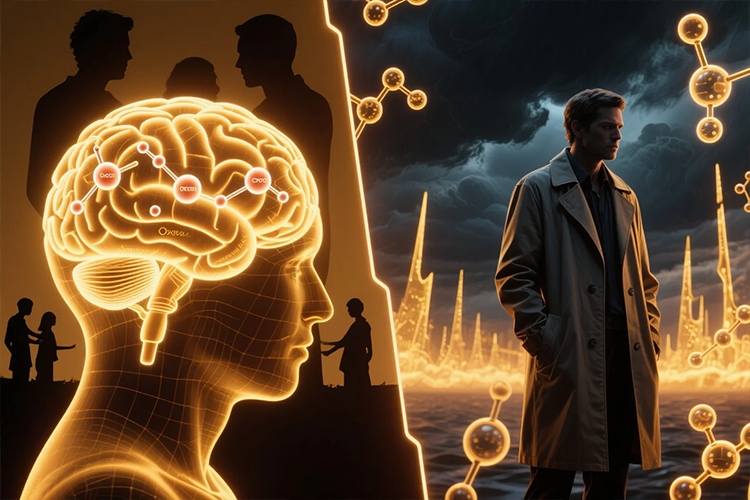In the annals of human history, few figures embody the paradox of social isolation and intellectual brilliance as starkly as Sir Isaac Newton. A man who reshaped our understanding of the universe with his laws of motion and gravity, Newton’s personal life was marked by profound loneliness. He had no romantic relationships, a nonexistent social circle, and only one fleeting friendship with John Wickins during his college years . Their bond, forged through shared academic pursuits, eventually crumbled due to Newton’s cold demeanor and inability to reciprocate emotional warmth. After Wickins’ departure, Newton never spoke of him again—a telling silence that underscores his detachment from human connection . Yet, despite his isolation, Newton achieved monumental scientific breakthroughs, leaving us to ponder: Do humans truly need friends?
The question is deceptively simple. Friends are not as vital as air or water, yet they profoundly shape our lives. This blog explores the duality of friendship—its transformative power and inherent challenges—through the lens of Newton’s life and modern research, with a special focus on adolescent friendships. By examining both the benefits and drawbacks, we can better navigate the eternal debate between solitude and companionship.

Table of Contents
The Science of Social Needs: Why Friends Matter
Humans are inherently social creatures. Evolutionary psychologists argue that our survival as a species depended on cooperation and social bonds, which fostered collective protection, resource sharing, and emotional support . This legacy persists in our biology: studies show that social connections trigger the release of oxytocin, the “bonding hormone,” which reduces stress and enhances feelings of trust . Conversely, prolonged social isolation activates the brain’s threat response system, increasing levels of cortisol (the stress hormone) and impairing immune function .
The consequences of isolation are staggering. Research links loneliness to a 50% higher risk of dementia, a 29% increased likelihood of heart disease, and a 32% greater chance of stroke . These risks are comparable to those of smoking or obesity, highlighting the biological imperative for human connection. Even introverts, who thrive in solitude, require meaningful interactions to maintain mental health . As Noah Speed notes in Medium, “Humans can’t be happy without some real connection with another human being” .

For teenagers, friendships are particularly critical. Adolescence is a period of rapid brain development, during which peer relationships shape identity formation, emotional regulation, and social skills . A 2024 study published in the American Journal of Psychiatry found that teenage friendships have lifelong health implications: friends’ genetic predispositions to substance abuse or mental health disorders can influence one’s own risk, especially between ages 16 and 19 . This “social contagion” effect underscores the power of adolescent peer groups to mold behavior and well-being.
Moreover, friendships provide a safe space for teens to practice conflict resolution, empathy, and self-disclosure—skills essential for adult relationships . Teens who lack close friends often struggle with loneliness, low self-esteem, and academic underperformance . As the CCMC School Blog emphasizes, “Teenage friendships are not just a phase; they are a fundamental aspect of growing up” .

The Costs of Connection: Challenges in Friendships
While friendships offer immense benefits, they are not without drawbacks. Maintaining relationships requires time, effort, and vulnerability—resources that can feel overwhelming, especially during adolescence. Teens often face peer pressure to conform, whether through risky behaviors or social norms, which can erode individuality . Toxic friendships, characterized by manipulation or jealousy, can even exacerbate mental health issues like anxiety and depression .
Isaac Newton’s brief friendship with Wickins exemplifies these challenges. Newton’s inability to reciprocate emotional support—a trait likely rooted in his introverted nature and traumatic childhood—ultimately doomed their bond . His story raises questions about the compatibility of intense intellectual focus with deep social ties. As the New York Times notes, “friendships require repotting”—adapting relationships across contexts to sustain them . For someone like Newton, who prioritized his work over emotional labor, such flexibility was impossible.
Friendships also demand compromise. Conflicts are inevitable, and resolving them requires humility and communication. For teens, navigating these dynamics can be daunting. A study by Fiveable highlights that adolescents often struggle with “deterioration” and “dissolution” of friendships due to unresolved disagreements . The fear of rejection or betrayal can lead some teens to withdraw entirely, reinforcing social isolation.

Newton’s Paradox: Solitude and Legacy
Newton’s life challenges the notion that friendship is a universal necessity. Despite his lack of social connections, he revolutionized science, leaving a legacy that endures centuries later. His story suggests that solitude can be a catalyst for innovation, allowing individuals to channel their energy into creative or intellectual pursuits. As the Study.com article states, Newton’s work “laid the foundation for modern science” —a feat that might have been impossible had he prioritized socializing over research.
Yet, Newton’s personal life was marked by bitterness and loneliness. He never married, had no close confidants, and died estranged from most of his family . His achievements came at a steep emotional cost. This raises a critical question: Is a life of solitude and legacy preferable to one of connection and fleeting joy?
The answer is deeply personal. For some, like Newton, the pursuit of excellence justifies the sacrifices. For others, the warmth of human connection outweighs any professional 成就. As the iFIT Blog notes, “friends make life more fun” —a sentiment Newton likely never fully appreciated.

Teenagers and the Balancing Act
For adolescents, the choice between solitude and social engagement is particularly fraught. On one hand, peer relationships are vital for emotional development and resilience . On the other, the pressure to conform or the fear of betrayal can make friendship feel like a minefield. Parents and educators play a crucial role in fostering healthy friendships by encouraging open communication, modeling conflict resolution, and creating environments where teens feel safe to be themselves .
Teenagers must also learn to discern between superficial and meaningful connections. The Medium article distinguishes between “entrepreneurial,” “consumer,” and “true” friendships, noting that only the latter offer lasting value . True friendships are built on trust, loyalty, and mutual respect—not transactional benefits or fleeting amusement.

Conclusion: A Choice, Not a Mandate
So, do humans need friends? The answer lies in the nuanced interplay of biology, psychology, and personal values. While friendships are not essential for survival, they profoundly enhance the quality of life—improving health, happiness, and resilience. For teenagers, they are a critical arena for learning and growth. Yet, as Newton’s story illustrates, solitude can fuel extraordinary achievements, albeit at a cost.
Ultimately, the decision to prioritize friendship or solitude is a deeply personal one. There is no universal “right” path. Some may thrive in bustling social circles, while others find fulfillment in quiet introspection. The key is to recognize the trade-offs and make choices that align with one’s values.
As we navigate the complexities of human connection, let us remember that friendship is not a destination but a journey—one that requires effort, vulnerability, and patience. Whether we emulate Newton’s singular focus or seek the warmth of companionship, the choice is ours. And in that choice, we define what it means to live a meaningful life.
“The greatest glory in living lies not in never falling, but in rising every time we fall.” – Nelson Mandela




